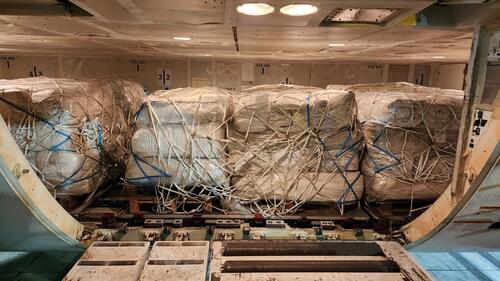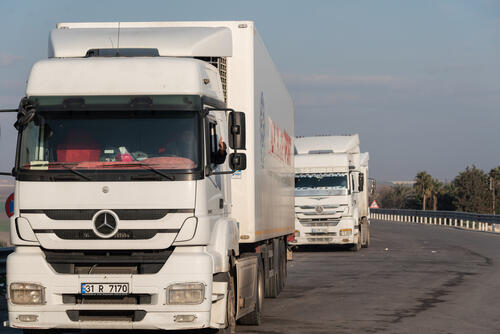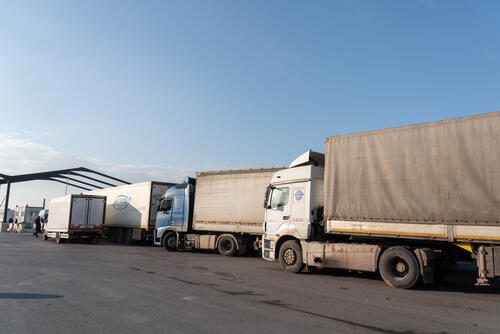Issued on: 19/02/2023
Al-Hammam Crossing (Syria) (AFP) – The group Doctors Without Borders called Sunday for the "urgent scaling up" of earthquake aid to northwest Syria as it delivered a convoy laden with emergency assistance.
Aid has been slow to reach Syria's rebel-held areas since the February 6 quake killed a combined total of more than 44,000 people across Turkey and Syria.
"An urgent increase in the volume of supplies is needed to match the scale of the humanitarian crisis," said the French aid group Doctors Without Borders (MSF).
It charged that supplies "currently fail to even match pre-earthquake volumes".
"Aid is trickling in in negligible amounts for the moment," said Hakim Khaldi, MSF's head of mission in Syria. "We emptied our emergency stocks in three days."
"According to UN data, five days after the earthquake, only 10 trucks had entered" rebel-held areas of Syria through the Bab al-Hawa crossing from Turkey, MSF said.
It added that "in the 10 days following the earthquake, the number of trucks that crossed the border into northwest Syria was lower than the average weekly number for 2022".
A convoy of 14 trucks laden with 1,269 tents and winter kits sent by MSF had arrived in Syria through the Al-Hammam crossing in the Afrin area on Sunday.
"The delivery was arranged outside of the United Nations cross-border humanitarian mechanism," the group said.
Activists and emergency teams in Syria's northwest have decried a slow UN response to the quake in rebel-held areas, contrasting it with the planeloads of aid that have been delivered to government-controlled airports.
Before the quake struck, almost all of the crucial humanitarian aid for the more than four million people living in rebel-controlled areas was being delivered through just one crossing, Bab al-Hawa.
The UN announced on Monday that Syrian President Bashar al-Assad had agreed to open two more border crossings from Turkey to northwest Syria to allow in aid.
Since the quake, the UN has sent more than 170 aid trucks to northwest Syria.
The conflict in Syria started in 2011 with the brutal repression of peaceful protests and escalated to pull in foreign powers and global jihadists.
Nearly half a million people have been killed, and the conflict has forced around half of the country's pre-war population from their homes.
© 2023 AFP
MSF aid convoy in relief of earthquake victims enters northwest Syria
A Médecins Sans Frontières convoy of 14 trucks, carrying aid from our hub in Dubai, entered northwestern Syria today, arriving from Türkiye through the Hammam border
“We emptied our emergency stocks in three days, donating nearly 12 tons of surgical equipment, dressing and medicines to hospitals,” says Hakim Khaldi, head of mission for MSF in Syria. “Our teams provided support to the health facilities in the area until they were exhausted.”
“But we did not see any help from the outside. Aid is trickling in in negligible amounts for the moment.”
Our teams identified enormous unmet needs in terms of relief. Access to accommodation and decent hygiene conditions are far from being granted, especially as the 180 000 people newly displaced by the 6 February earthquake add to the two-million people displaced by 12 years of war and already living in precarious conditions.

The aid shipment being prepared for delivery. Dubai, February 2023.

Fourteen MSF trucks loaded with tents and winter kits are crossing to northwest Syria, from Hamam crossing point in Türkiye. Türkiye, February 2023.
A Médecins Sans Frontières convoy of 14 trucks, carrying aid from our hub in Dubai, entered northwestern Syria today, arriving from Türkiye through the Hammam border
crossing point.
Earthquakes in Türkiye and Syria: find out how we're responding
Press Release 19 February 2023
Press Release 19 February 2023
A Médecins Sans Frontières (MSF) convoy of 14 trucks entered northwestern Syria today, arriving from Türkiye through the Hammam border crossing point. This first convoy carries 1,296 tents destined to families (of five people or more) left homeless by the earthquake and 1,296 winter kits to insulate the tents from the cold. Other MSF convoys are planned to follow quickly to deliver medical and non-medical equipment.
However, warns MSF, an urgent increase in the volume of supplies is needed to match the scale of the humanitarian crisis. In the ten days following the earthquake, the number of trucks that crossed the border into northwest Syria was lower than the average number for 2022. Present in the area for more than ten years, MSF teams have been able to immediately launch an emergency response.
However, warns MSF, an urgent increase in the volume of supplies is needed to match the scale of the humanitarian crisis. In the ten days following the earthquake, the number of trucks that crossed the border into northwest Syria was lower than the average number for 2022. Present in the area for more than ten years, MSF teams have been able to immediately launch an emergency response.
We emptied our emergency stocks in three days, donating nearly 12 tons of surgical equipment, dressing and medicines to hospitals.
HAKIM KHALDI, HEAD OF MISSION FOR MSF IN SYRIA.
“We emptied our emergency stocks in three days, donating nearly 12 tons of surgical equipment, dressing and medicines to hospitals,” says Hakim Khaldi, head of mission for MSF in Syria. “Our teams provided support to the health facilities in the area until they were exhausted.”
“But we did not see any help from the outside. Aid is trickling in in negligible amounts for the moment.”
Our teams identified enormous unmet needs in terms of relief. Access to accommodation and decent hygiene conditions are far from being granted, especially as the 180 000 people newly displaced by the 6 February earthquake add to the two-million people displaced by 12 years of war and already living in precarious conditions.

The aid shipment being prepared for delivery. Dubai, February 2023.
AHMAD AMER/MSFSHARE
MSF is currently providing relief and medical support to people living in five reception centers in northern Idlib. A mobile team provides health care and we distributed tents, water, bread, blankets, mattresses, and fire extinguishers. Activities aimed at ensuring the continuity of access to health care for both victims of the earthquake and more generally are starting next week.
Humanitarian aid provided to the region through the cross-border mechanism has not even matched its pre-earthquake average volume yet. According to UN data, five days after the earthquake, only ten trucks had entered Syria through Bab al-Hawa, a UN-coordinated border crossing point for humanitarian aid from neighbouring Türkiye.
MSF is currently providing relief and medical support to people living in five reception centers in northern Idlib. A mobile team provides health care and we distributed tents, water, bread, blankets, mattresses, and fire extinguishers. Activities aimed at ensuring the continuity of access to health care for both victims of the earthquake and more generally are starting next week.
Humanitarian aid provided to the region through the cross-border mechanism has not even matched its pre-earthquake average volume yet. According to UN data, five days after the earthquake, only ten trucks had entered Syria through Bab al-Hawa, a UN-coordinated border crossing point for humanitarian aid from neighbouring Türkiye.

Fourteen MSF trucks loaded with tents and winter kits are crossing to northwest Syria, from Hamam crossing point in Türkiye. Türkiye, February 2023.
ABDULMONAM EASSA/MSFSHARE
As of 17 February, a total of 178 trucks loaded with aid provided by six UN agencies had crossed into northwest Syria through Bab Al-Hawa and Bab Al-Salama. In 2022, 7,566 trucks loaded with aid crossed from Türkiye into northwest Syria, which represents an average of 227 trucks for the same period of 11 days.
Furthermore, part of the 178 trucks that reached northwest Syria were not part of the earthquake response but rather already-planned deliveries. Even considering three days of border closure, the current volume of trucks is barely matching the humanitarian response before the disaster.
Fourteen MSF trucks loaded with tents and winter kits are crossing to northwest Syria, from Hamam crossing point in Türkiye. Türkiye, February 2023
As of 17 February, a total of 178 trucks loaded with aid provided by six UN agencies had crossed into northwest Syria through Bab Al-Hawa and Bab Al-Salama. In 2022, 7,566 trucks loaded with aid crossed from Türkiye into northwest Syria, which represents an average of 227 trucks for the same period of 11 days.
Furthermore, part of the 178 trucks that reached northwest Syria were not part of the earthquake response but rather already-planned deliveries. Even considering three days of border closure, the current volume of trucks is barely matching the humanitarian response before the disaster.

Fourteen MSF trucks loaded with tents and winter kits are crossing to northwest Syria, from Hamam crossing point in Türkiye. Türkiye, February 2023
ABDULMONAM EASSA/MSFSHARE
The border crossing of the MSF convoy was possible thanks to the support of Al Ameen, a Syrian NGO partnering with MSF. The delivery was arranged outside of the United Nations cross-border humanitarian mechanism coordinated by the WHO, which does not cover logistical equipment.
MSF calls for the immediate scaling up of the assistance for the people affected by the earthquake in northwest Syria, in order to address the new humanitarian needs adding to those already prevailing in the area.
In particular, priority should be given to supplying shelters and water and sanitation equipment, as well as the medical supplies necessary for post-operative care and to maintain continuity of care, amongst other items which are urgently needed.
The border crossing of the MSF convoy was possible thanks to the support of Al Ameen, a Syrian NGO partnering with MSF. The delivery was arranged outside of the United Nations cross-border humanitarian mechanism coordinated by the WHO, which does not cover logistical equipment.
MSF calls for the immediate scaling up of the assistance for the people affected by the earthquake in northwest Syria, in order to address the new humanitarian needs adding to those already prevailing in the area.
In particular, priority should be given to supplying shelters and water and sanitation equipment, as well as the medical supplies necessary for post-operative care and to maintain continuity of care, amongst other items which are urgently needed.
No comments:
Post a Comment